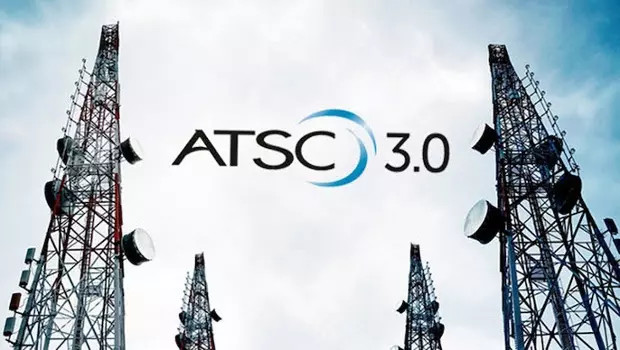NAB Urges FCC to Avoid Action on ATSC 3.0 Patents
NAB filing says FCC has no authority in patent marketplace and that FCC action “would not solve any apparent problem” in the rollout of NextGen TV

WASHINGTON, D.C.—The NAB has filed comments with the FCC urging the agency not to take any action at this time regarding the marketplace for ATSC 3.0 standard essential patents that form the basis of NextGen TV.
The issue was recently highlighted after LG was hit with damages in a 3.0 patent dispute and the TV manufacturer's subsequent comments to the FCC that it was suspending its 2024 lineup of NextGen TV, aka ATSC 3.0, capable TVs. The decision raised worries that other TV manufacturers might follow.
In a filing with the FCC in response to the Commission’s Fourth Further Notice of Proposed Rulemaking (FNPRM) concerning the state of the marketplace for ATSC 3.0 standard essential patents, the NAB argued that “Initial comments in this matter strongly suggest that the Commission should refrain from further action at this time, as the market for ATSC 3.0 receivers remains strong, there is no basis for Commission authority over the patent marketplace, and Commission action would not solve any apparent problem. We urge the Commission to continue to focus on avenues for accelerating the ATSC 3.0 transition that fall within the Commission’s jurisdiction and expertise.”
The NAB noted that “no commenter has identified any statutory basis for Commission regulation of the patent marketplace” and that the FCC’s “FNPRM itself identifies no statutory basis for Commission jurisdiction over the patent marketplace. Indeed, the only support the FNPRM offers for Commission authority in this regard are comments from two parties, Qualcomm and Ericsson, who have now corrected the Commission’s suggestion that they previously acknowledged the Commission had taken action to prevent the abuse of patent rights. In particular, Ericsson states directly that it `has not suggested that the FCC has previously regulated patent licensing,’ and that `on the contrary, it is Ericsson’s view that the FCC cannot introduce any measures to regulate standards essential patents licensing or to prevent unsupported claims of patent abuse.’”
The NAB also argued that “[b]eyond the fact that the Commission likely lacks authority to regulate patent licensing terms, there is no reason to believe that any such regulation would solve any current problem in the marketplace. As NAB noted in its initial comments, there is a growing marketplace for ATSC 3.0 compatible equipment, and consumers have a number of choices with respect to purchasing such equipment. Major television set manufacturers have several models of 3.0 compatible sets available for sale at a variety of screen sizes and price points. Industry estimates suggest that, by the end of 2023, approximately ten million 3.0 compatible sets will have been sold, with tens of millions more sets expected to be sold in the years following. In addition, consumers interested in purchasing an accessory device that allows them to receive an ATSC 3.0 signal using their current television set will soon have multiple options. ADTH is already marketing and shipping a certified NEXTGEN TV accessory device that is available for less than $100. Zinwell announced it will also begin selling NEXTGEN TV certified devices later this year….The comments of LG Electronics USA in this proceeding [about suspending their 2024 line-up of 3.0 TVs] do not change these facts, nor do they demonstrate that there is a consumer problem that could conceivably be addressed through Commission action.”
“LG’s decision to pause inclusion of ATSC 3.0 compatible receivers in its 2024 television lineup should be viewed as an unfortunate data point in a marketplace that is still in the process of developing, not as an invitation to unprecedented and overbroad Commission regulation,” the NAB stressed.
The NAB also said that “Commission action could thus have the unintended consequence of distorting the market and creating unhelpful incentives for entities not subject to Commission regulation.”
Get the TV Tech Newsletter
The professional video industry's #1 source for news, trends and product and tech information. Sign up below.
Instead, the NAB argued that the FCC should focus on positive action to aid the spread of 3.0 broadcasts by looking “for opportunities to speed the deployment of ATSC 3.0 service and the adoption of 3.0 equipment, including by allowing broadcasters greater ability to differentiate their service during the transition.”
“We urge the Commission to be proactive in exploring additional ways to accelerate the transition on both the transmission side (broadcasters) and the reception side (manufacturers and consumers),” the NAB argued. “A successful ATSC 3.0 transition is critical for over-the-air viewers to continue to have a competitive free service offering. Ultimately, if broadcasters are unable to meaningfully distinguish their 1.0 and 3.0 service, that poses a far greater threat to the transition and to over-the-air viewers than hiccups in the developing patent marketplace.”
George Winslow is the senior content producer for TV Tech. He has written about the television, media and technology industries for nearly 30 years for such publications as Broadcasting & Cable, Multichannel News and TV Tech. Over the years, he has edited a number of magazines, including Multichannel News International and World Screen, and moderated panels at such major industry events as NAB and MIP TV. He has published two books and dozens of encyclopedia articles on such subjects as the media, New York City history and economics.

